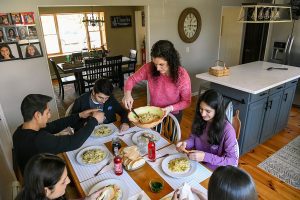(OSV News) – Only about 15% of U.S. adults who were raised Catholic said they had remained practicing Catholics attending weekly Mass into adulthood, according to data from the General Social Survey conducted by the National Opinion Research Center at the University of Chicago.
But what were some of the things that distinguished the families of those children who remained practicing Catholics as adults from those who left the faith entirely? Seeking answers to this question, researchers at Georgetown University’s Center for Applied Research in the Apostolate and the Peyton Institute for Domestic Church Life conducted the “Future Faithful Families Project” study.

The interviews for the study were conducted with 28 individuals from June 2021 to February 2023 and included qualifying participants from past CARA surveys. The study noted “a greater lack of response from the adult children than the parents who had been interviewed,” but added that “it is well known in the social science research fields that it is often easier to recruit participation from older adults than young adults.”
The study found that participants from these families generally described their households as “warmer and more affectionate than the average family.” Most of the participants also indicated “very good communication” within the family.
Another shared thread among those interviewed was having rituals of meals eaten together and prayer, with most indicating that faith was a part of family routines regardless of the routines themselves.
Additionally, all participants emphasized the importance of weekly Mass attendance and nearly all participants reported doing service work and giving to charity, with many doing so through their parish or a church organization.
Mark Gray, director of CARA Catholic Polls, co-wrote the study along with Greg Popcak, co-executive director of the Peyton Institute for Domestic Church Life. Gray told OSV News that while the findings from these qualitative interviews were not meant to be taken as some sort of “checklist” of things to keep one’s child Catholic, parents could gain insight from the common responses.
For these families, he said, “their faith wasn’t just something that they went and did on Sunday morning; their faith was present in the household. It was present every day. It came out in conversations about the faith, with prayer, with things that are in the home.”
He also noted that when children would come to the parents with doubts about the faith, most of the parents “went on a journey with their children and said, ‘Well, let’s see why the church teaches this,'” as opposed to strictly shutting down questioning of the church’s teachings.
“It’s a lot of discussion, working through things, thinking about things rather than being this overbearing parental force,” he said.
The study also included an analysis of existing data from the General Social Survey, or GSS, going back to the 1970s, which showed a marked decline in the number of U.S. adults who were raised Catholic and stayed Catholic while still attending Mass weekly.
In the 1970s, “an average of 36% of those who were raised Catholic remained Catholic as adults and attended Mass weekly (peaking at 40% in 1977).” GSS data later showed “this average percentage declined to 32% in the 1980s, 25% in the 1990s, and 21% in the 2000s. In the 2010s, this averaged 15% and was 14% in the 2018 study.”
These numbers exclude those who converted to Catholicism but were not raised Catholic. The study also notes the large number of Catholics who have immigrated to the U.S.
Focusing on the 51% of U.S. adults who were raised Catholic and had remained so between 2010 to 2018, there were some commonalities. Among weekly Mass attendees who had remained Catholic, 81% were “more likely to have been living with both parents at age 16” compared to the 72% who attend Mass less often than weekly or the 63% who left the Catholic faith.
Gray said that the families they spoke with referenced things that “any parent can do,” noting the importance of the child to see their parent be “Catholic every day of the year, not just on Sundays” and for the parent “to listen to their children and have conversations with them, and guide them through what the faith teaches and why the faith teaches it.”
